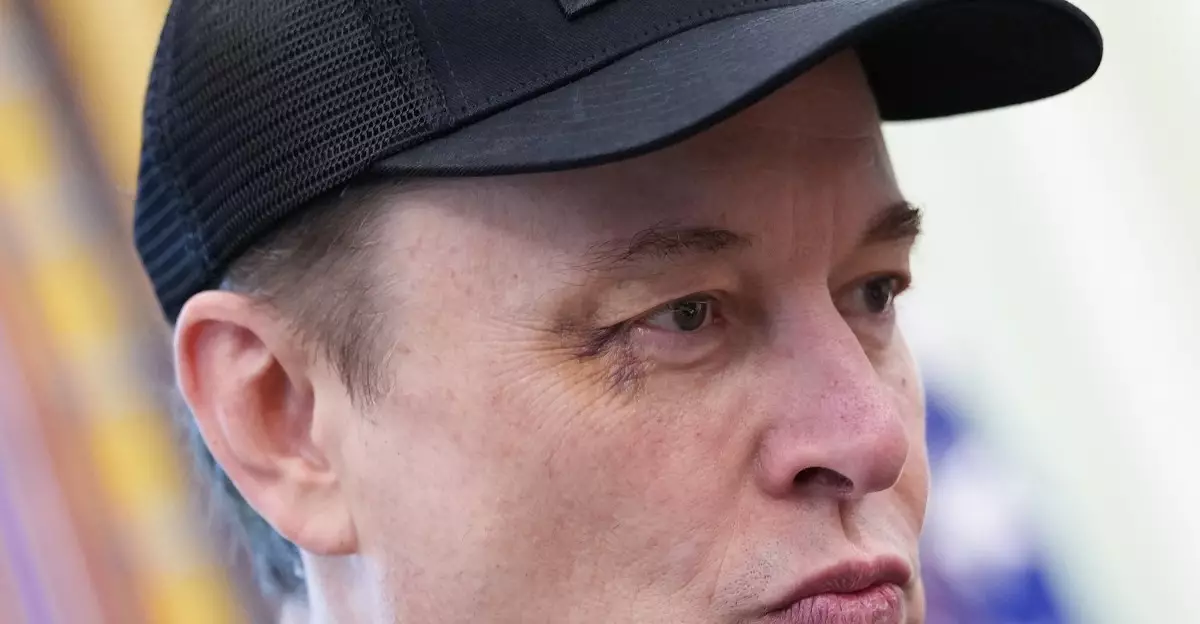Elon Musk’s recent tenure as the helm of the Department of Government Efficiency (DOGE) parallels the chaos of his high-profile ventures in the tech realm. Under intense scrutiny and public pressure, Musk emerges with visible marks from his stay—both literally and figuratively. A black eye, which he humorously attributes to his son, serves as a metaphorical memento of the clash between his aggressive leadership style and the often-unforgiving environment of governmental bureaucracy. His assertion that his work has substantially benefited the government is overshadowed by an unfortunate reality: the perception of his effectiveness is falling like Tesla’s stock price amidst dwindling market shares.
Musk’s departure from DOGE marks a pivotal moment. Once celebrated for his audacity and innovative spirit, public sentiment increasingly tilts against him. According to surveys, he is among the least favored public figures in America. This perception is compounded by claims regarding catastrophic cuts to humanitarian aid, leading to dire consequences overseas. Among these claims, a research study correlating his cuts to numerous unnecessary deaths—predominantly affecting children—paints a grim narrative that contradicts Musk’s self-portrayal of altruism.
Unwinding the Myths
Musk’s narrative framing—wherein he claims DOGE will persist as an institution and further the goals he set—necessitates scrutiny. During a recent Oval Office press conference alongside former President Trump, he exuded confidence, wearing attire that boldly declared, “The Dogefather.” However, beneath this bravado lies a bitter truth: the efficacy of DOGE remains questionable. While Musk announces lofty figures of funding cuts amounting to $1 trillion, independent analysts assert that the reality is catastrophic for the bureaucratic landscape. His PR campaign might present the façade of success, yet the tangible outcomes have not materialized as promised.
DOGE’s operations, marked by volatility, staggering layoffs, and a haphazard approach to personnel management, have sown discord rather than efficiency. As cited by the Partnership for Public Service, its policy implementations could have cost the government massive funds, effectively negating any financial benefits Musk suggests were realized. In navigating the complexities of governmental structures, the promise of streamlined processes has often been traded for confusion and mismanagement.
The Paradox of Innovation and Inefficiency
Musk’s ambition paradoxically intertwines innovation with inefficiency. As a businessman, he excels at stimulating conversations and igniting passion among followers. However, this same talent for disruption becomes problematic within the realm of governance, where processes require steadiness and careful deliberation. His leadership style, known for rapid shifts and high-risk decisions, clashes with the methodical pace required in governmental operations—a realm where stakeholders expect stability.
Despite substantial challenges, Musk is adamant about DOGE’s enduring presence. He likens it to a philosophical journey, suggesting that the entity has the potential to transcend its operational shortcomings and evolve over time. Yet, such assertions teeter on a precarious balancing act of optimism and denial. A choice of “Buddhism” as a metaphor implies a consideration of enlightenment, but it risks obscuring the pressing need for accountability.
A Tangled Legacy
With his departure from DOGE, Musk’s legacy appears entangled with both commendable and condemnable elements. His innovations undeniably usher in discussions about efficiency and government reform, yet the aftermath raises questions about sustainable practices and humane decision-making. While Trump acknowledged Musk’s contributions during their meeting, framing him as irreplaceable, the truth remains more complex.
The future of DOGE may well depend less on Musk’s ambitious proclamations and more on the responses of those who operate within the established systems he sought to reform. Will they uphold the vision of efficiency, or will they succumb to the chaos that has characterized much of Musk’s influence—both in the corporate and governmental arenas?
Musk’s combination of bravado and vulnerability paints a complicated picture of a man attempting to reshape institutions while grappling with the implications of his methods. The road ahead is fraught with uncertainty, yet the dialogue he sparks continues to resonate, compelling society to examine the boundaries of innovation in leadership.


Leave a Reply